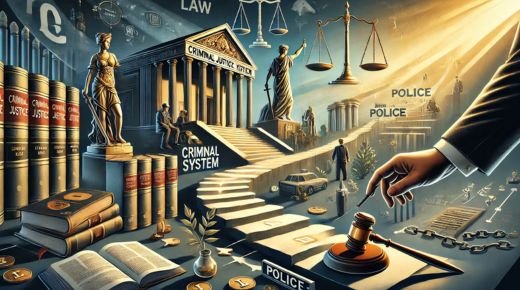The criminal justice system can be complex and overwhelming, especially for those who find themselves involved in legal matters. Understanding how the system works and what steps to take can make a significant difference in the outcome of a case. This guide provides a step-by-step overview of navigating the criminal justice system, ensuring you are well-informed and prepared at each stage of the process.
1. Understanding the Criminal Justice System
The criminal justice system is designed to enforce laws, deliver justice, and ensure that those accused of crimes receive a fair trial. It consists of three main components:
- Law Enforcement: Police officers and investigative agencies who enforce laws and investigate crimes.
- Judiciary: Courts where cases are heard, and judges and juries make decisions.
- Corrections: Institutions and programs that manage individuals who have been convicted of crimes.
2. The Arrest
The journey through the criminal justice system typically begins with an arrest. If law enforcement suspects that you have committed a crime, they will arrest you and take you into custody. At this point, it is crucial to remain calm and comply with the officers’ instructions. You have the right to remain silent and the right to an attorney. It is highly advisable to exercise these rights and refrain from making any statements without legal representation.
3. Booking and Initial Appearance
After your arrest, you will be booked, which involves recording your personal information, taking fingerprints, and photographing you. Following the booking process, you will have an initial appearance in court, where the charges against you will be read, and bail will be discussed. During this hearing, you can enter a plea of guilty, not guilty, or no contest. It is important to have an attorney present during this stage to help navigate the legal proceedings and advise you on the best course of action.
4. Preliminary Hearing
The preliminary hearing is a critical step where the judge will determine whether there is enough evidence to proceed with the case. This hearing is typically held shortly after the initial appearance. The prosecution will present evidence to show that there is probable cause to believe you committed the crime. If the judge finds sufficient evidence, the case will move forward to the next stage. If not, the charges may be dismissed.
5. Arraignment
During the arraignment, you will formally enter your plea before the court. This is an important stage where you will either plead guilty, not guilty, or no contest. If you plead guilty or no contest, the judge will proceed to sentencing. If you plead not guilty, the case will move to trial. Your attorney will play a crucial role in advising you on the best plea to enter based on the evidence and legal strategy.
6. Pre-Trial Motions and Discovery
Before the trial begins, both the defense and prosecution will engage in pre-trial motions and discovery. During this phase, both sides exchange evidence and information related to the case. Pre-trial motions may include requests to suppress certain evidence or dismiss charges. Discovery involves gathering evidence, interviewing witnesses, and preparing for trial. This stage is vital for building a strong defense strategy and understanding the prosecution’s case.
7. Trial
If your case proceeds to trial, it will be heard before a judge and, in some cases, a jury. The trial process involves several key stages:
- Opening Statements: Both the prosecution and defense present their initial arguments and outline what they intend to prove during the trial.
- Presentation of Evidence: The prosecution presents its case first, followed by the defense. Each side will present evidence, call witnesses, and make arguments to support their case.
- Cross-Examination: Both sides have the opportunity to cross-examine witnesses to challenge their credibility and the evidence presented.
- Closing Arguments: After all evidence has been presented, both sides make their final arguments summarizing their case and highlighting key points.
- Jury Deliberation and Verdict: If the trial is before a jury, the jury will deliberate in private to reach a verdict. If the trial is before a judge, the judge will render a verdict. The verdict will be either guilty or not guilty.
8. Sentencing
If you are found guilty, the court will proceed to sentencing. The judge will consider various factors, including the severity of the crime, any prior criminal history, and mitigating circumstances. Sentencing options may include probation, fines, community service, imprisonment, or a combination of these. Your attorney can help present arguments and evidence to potentially reduce the severity of the sentence.
9. Appeals
If you believe there were legal errors or procedural issues during your trial, you have the right to appeal the verdict. The appeals process involves challenging the trial’s outcome in a higher court. The appellate court will review the case for errors and determine whether the verdict should be upheld, overturned, or remanded for a new trial. An experienced appellate attorney is essential for navigating this complex process.
10. Post-Conviction
After a conviction, there are several post-conviction options available, including seeking a pardon, expungement, or modification of the sentence. A pardon may remove the legal consequences of a conviction, while expungement may seal or erase the criminal record. Modifying the sentence may involve requesting a reduction in the length of imprisonment or altering conditions of probation. Consulting with your attorney can help determine the best course of action for your situation.
11. Rehabilitation and Reintegration
For individuals who have been convicted and are serving a sentence, rehabilitation and reintegration are essential components of the criminal justice system. Programs and services are available to help individuals address underlying issues, such as substance abuse or mental health problems, and prepare for reintegration into society upon release. Successful reintegration involves finding stable housing, employment, and support systems to prevent recidivism and promote positive change.
Conclusion
Navigating the criminal justice system can be a challenging and daunting experience. However, understanding each step of the process and knowing what to expect can help alleviate some of the stress and uncertainty. From the initial arrest to potential post-conviction actions, having a knowledgeable attorney by your side is crucial for ensuring that your rights are protected and that you receive fair treatment throughout the legal process. By staying informed and prepared, you can effectively navigate the complexities of the criminal justice system and work towards a favorable resolution.





